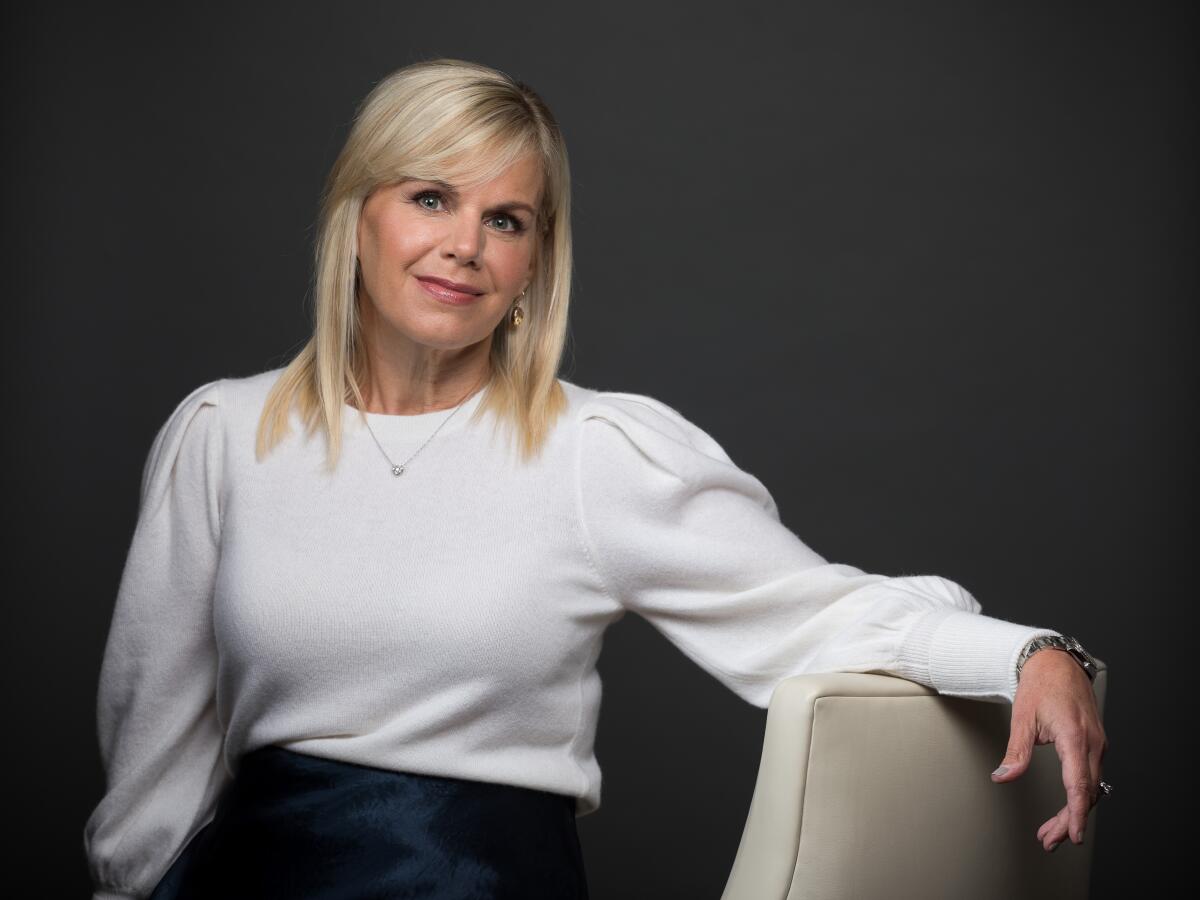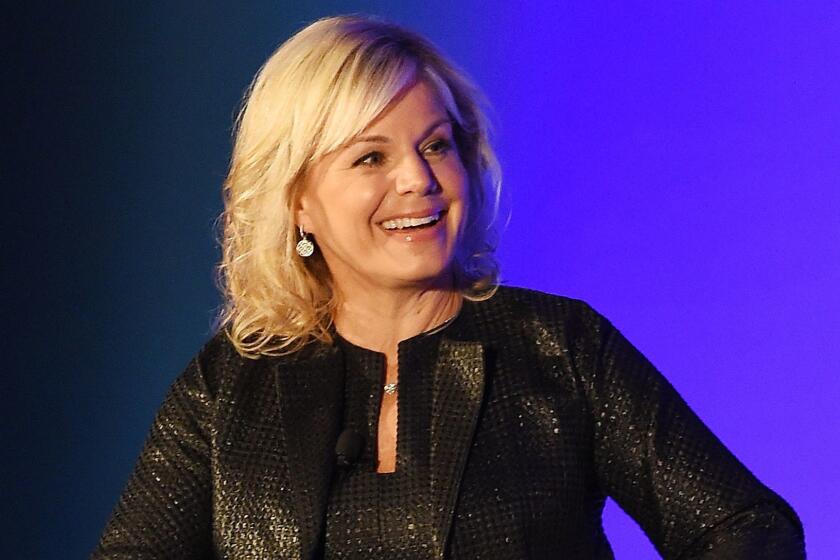After Fox News and her Miss America detour, Gretchen Carlson returns to broadcasting

Nicole Kidman and Naomi Watts portray her onscreen but former Fox News star Gretchen Carlson is telling new stories in documentaries for Lifetime
- Share via
NEW YORK — When Gretchen Carlson filed a sexual harassment lawsuit against Fox News chief executive Roger Ailes in July 2016, she figured her career was over.
“I thought I would be home for years, crying. Instead, they started an investigation. All these other women came forward. And two weeks later, he was fired,” says the former “Fox & Friends” anchor on a warm afternoon in early September. It is nearly three years to the day after she reached a $20-million settlement with 21st Century Fox and received an extraordinary public apology from her former employer — a key milestone in what would eventually become known as the #MeToo movement.
“There is no way I could have known how this story would play out.”
By toppling one of the most powerful figures in American media, Carlson sent a message to other survivors — not to mention enterprising journalists — that even seemingly untouchable men such as Harvey Weinstein and Bill O’Reilly could be held accountable for their alleged transgressions.
Instead of crying at home as she once feared, Carlson has been able to pursue other professional opportunities. The Miss America winner has published a book, “Be Fierce: Stop Harassment and Take Your Power Back,” and advocated for the end of forced arbitration clauses in employment contracts — which, she says, have enabled workplace harassment by silencing women, burying their allegations and keeping predators on the job.
Once ridiculed on “The Daily Show,” Carlson is now in the unexpected position of having two acclaimed actresses play her onscreen — Naomi Watts in the recent Ailes-centered Showtime series “The Loudest Voice” and Nicole Kidman in the upcoming Jay Roach film “Bombshell,” focused on the women at Fox who were harassed by Ailes.
She also weathered a controversial run as the chairwoman of the Miss America Organization, where she pushed to drop the swimsuit competition, but was accused of “silencing” and “marginalizing” then-reigning Miss America Cara Mund (an investigation cleared her of wrongdoing). Carlson is excited to return to broadcasting with a series of topical documentaries for Lifetime, “Beyond the Headlines: Escaping the NXIVM Cult with Gretchen Carlson,” which airs Sept. 21, and “Beyond the Headlines: The College Admissions Scandal with Gretchen Carlson,” which airs Oct. 12.
The bikinis got smaller and smaller until they disappeared altogether.
“I’ve gained so much more perspective over these last three years,” she says, “and feel like I’m the journalist out there to lead us into the 21st century.”
Your Fox settlement legally barred you from participating in “The Loudest Voice” and “Bombshell.” What has it been like for you to see your life play out in pop culture without having much say in it?
I talked to a couple of people who used to work at Fox News, and they said to me, “I couldn’t get past episode one [of ‘The Loudest Voice’] because of PTSD.” I felt that watching it, for sure. But something made me persevere.
I think these projects are great because they are keeping the dialogue going in a big, huge way. There were so many articles written about my story over the last few years, but I really think when people saw it playing out on TV they were like, oh, my God. The visual medium can be so much more powerful, especially with this topic, because there are so many myths and misunderstandings.
Gretchen Carlson’s lawsuit and Cosby’s accusers paved the way for Weinstein allegations to go public
After the New York Times report detailing sexual harassment claims against Harvey Weinstein broke on Thursday, many who worked with the mogul asked why it took so long for the allegations to become public.
If I had told you three years ago that Showtime was going to do a miniseries about me and that Jay Roach was going to do a potential blockbuster movie on this topic, you would have laughed at me. Let me also say, the idea that Naomi Watts and Nicole Kidman are playing me — that’s surreal on its face.
As frustrating as it might be to not be able to say, “Wait a minute, let me tell you what really happened,” if the overarching message is pretty accurate and if, in the end, it encourages more women to come forward and continues the national dialogue, then they’re home runs.
In the past, both political parties have dismissed allegations of sexual misconduct against members of their own ranks. We’ve seen it recently with President Trump and Supreme Court Justice Brett M. Kavanaugh. How do we make this a nonpartisan issue?
It’s completely disingenuous for people to use politics as a reason why they don’t believe somebody who’s had the courage to come forward or call these women liars. That’s why I’ve been pounding the pavement on Capitol Hill, meeting with Republicans and Democrats. This is an apolitical issue. Before someone decides to sexually harass you, they don’t ask what party you’re in; they just do it because it’s all about power. You cannot fall on the sides of things because you don’t like the political outcome.
We’ve come a long way in a short period of time. Cultural shifts don’t happen overnight. Look at how long it took [women] to be able to vote. We’ve seen massive movement on this issue, not that we still don’t have a lot of work to do. Three years after my story, it’s astounding really how far we’ve come. But it’s a long road.
To some critics, your work at Fox News doesn’t quite square with your current image as a champion of gender equality. How do you respond to those charges?
Editorial staffs at every establishment as a group are in charge of putting together the stories. There’s a misnomer out there that individual anchors say, “This is what I’m going to say today.” I had my moments of protest. And maybe they were subtle, but I had to approach it with a scalpel not a dagger. I was in a tough position. My moments of protest are all public out there. I walked off the set one day when they said woman have too many rights. I said, “Really? Well, then, you guys handle it.” Three weeks before I got fired, I came out and said I was in favor of reinstating the assault weapons ban. I said that at Fox. A couple of weeks before that, I did a piece on Robin Wright who was arguing at the time she wasn’t being paid fairly on “House of Cards.” I 100% supported her and that also was not a typical editorial line.
Do you have advice for reporters covering stories like yours?
Do stories on women no one has heard about. It’s not just famous Hollywood actresses and well-known journalists. It’s happening in every profession across this country. And why do we almost immediately talk about redemption for the perpetrators? In my unscientific study of watching it over the last three years, it’s systematic. It’s about two weeks: The chyron comes up on the screen, and it says, “When should forgiveness start?” “Charlie Rose is making a comeback.” “When should Matt Lauer be back on TV?”
For some reason, we do that, instead of doing the story about all the women who’ve been blacklisted and never been heard from again. I would love to see more focus on these invisible women. Who, by the way, are members of our military, teachers, police officers, oil rig operators, airplane mechanics, lawyers, doctors, wall street bankers, PhDs, it’s a pervasive epidemic in every socioeconomic class and every profession, and I didn’t even know that when I filed my case. Because we didn’t talk about it.
What did you hope to achieve during your time with the Miss America Organization?
I did it out of the goodness of my heart because the organization helped me tremendously. I paid for my last year of Stanford with scholarship money. My effort was to move it into the 21st century and move it back into relevancy. As a board, we unanimously decided to take away the sexual objectification of women. We wanted to make it more open and inclusive to women who didn’t want to parade around in a bikini wearing 4-inch heels but wanted to go to school. I feel like that was a great accomplishment. Whatever criticism there was, people are entitled to that, but I think history will show these were the right decisions.
So I take it you didn’t relish the swimsuit competition when you were a contestant?
Oh, God, no. I was a serious classical violinist. The scoring was 50[%] talent, 30% interview. Swimsuit was 10 or 15%, and it was something I had to do to try and win. I’m 5-foot-3; I struggled with my weight my whole life. I wore Huskies as a kid. So the swimsuit thing, for me, was hard. So I used my discipline and perseverance to get in shape, and I don’t think there’s anything wrong with that. But I knew I wasn’t going to win that part of the competition; all I had to do was kinda place, so I didn’t tank it. I would have been dead last at Miss USA.
Is it a relief to be able to wear pants now that you’re no longer working at Fox?
I love pants, especially on days when I don’t shave my legs, which is quite frequently. I love pants. And I love black.
Q&A
The Sunday Conversation
More interviews with fascinating people in entertainment and the arts
More to Read
The complete guide to home viewing
Get Screen Gab for everything about the TV shows and streaming movies everyone’s talking about.
You may occasionally receive promotional content from the Los Angeles Times.








